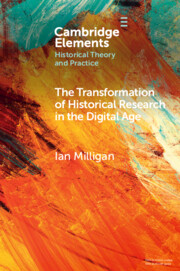 The Transformation of Historical Research in the Digital Age
by
Ian Milligan
Historians make research queries on Google, ProQuest, and the HathiTrust. They garner information from keyword searches, carried out across millions of documents, their research shaped by algorithms they rarely understand. Historians often then visit archives in whirlwind trips marked by thousands of digital photographs, subsequently explored on computer monitors from the comfort of their offices. They may then take to social media or other digital platforms, their work shaped through these new forms of pre- and post-publication review. Almost all aspects of the historian's research workflow have been transformed by digital technology. In other words, all historians - not just Digital Historians - are implicated in this shift. The Transformation of Historical Research in the Digital Age equips historians to be self-conscious practitioners by making these shifts explicit and exploring their long-term impact. This title is also available as Open Access on Cambridge Core.
The Transformation of Historical Research in the Digital Age
by
Ian Milligan
Historians make research queries on Google, ProQuest, and the HathiTrust. They garner information from keyword searches, carried out across millions of documents, their research shaped by algorithms they rarely understand. Historians often then visit archives in whirlwind trips marked by thousands of digital photographs, subsequently explored on computer monitors from the comfort of their offices. They may then take to social media or other digital platforms, their work shaped through these new forms of pre- and post-publication review. Almost all aspects of the historian's research workflow have been transformed by digital technology. In other words, all historians - not just Digital Historians - are implicated in this shift. The Transformation of Historical Research in the Digital Age equips historians to be self-conscious practitioners by making these shifts explicit and exploring their long-term impact. This title is also available as Open Access on Cambridge Core.
 Digital Community Engagement
by
Rebecca Wingo (Editor); Jason Heppler (Editor); Paul Schadewald (Editor)
Digital Community Engagement brings together cutting-edge campus-community partnerships with a focus on digital projects. Through a series of case studies authored by academics and their community partners, this collection explores models for digital community engagement that leverage new media through reciprocal partnerships. The contributions to this volume stand at the crossroads of digital humanities, public history, and community engagement.
Digital Community Engagement
by
Rebecca Wingo (Editor); Jason Heppler (Editor); Paul Schadewald (Editor)
Digital Community Engagement brings together cutting-edge campus-community partnerships with a focus on digital projects. Through a series of case studies authored by academics and their community partners, this collection explores models for digital community engagement that leverage new media through reciprocal partnerships. The contributions to this volume stand at the crossroads of digital humanities, public history, and community engagement.
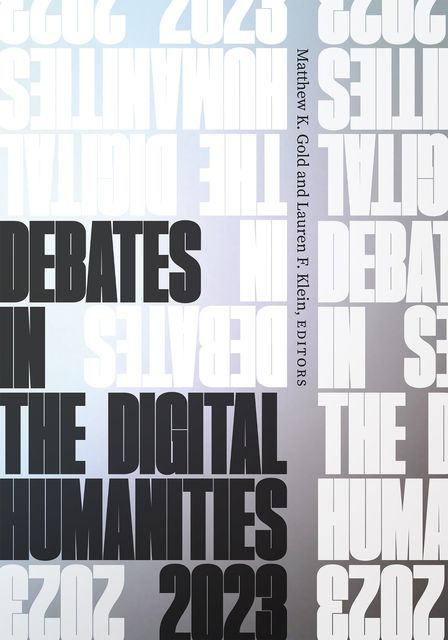 Debates in the Digital Humanities 2023
by
Matthew K. Gold (Editor); Lauren F. Klein (Editor)
Where do the digital humanities stand in 2023? Debates in the Digital Humanities 2023 presents a state-of-the-field vision of digital humanities amid rising social, political, economic, and environmental crises; a global pandemic; and the deepening of austerity regimes in U.S. higher education. Providing a look not just at where DH stands but also where it is going, this fourth volume in the Debates in the Digital Humanities series features both established scholars and emerging voices pushing the field’s boundaries, asking thorny questions, and providing space for practitioners to bring to the fore their research and their hopes for future directions in the field. Carrying forward the themes of political and social engagement present in the series throughout, it includes crucial contributions to the field—from a vital forum centered on the voices of Black women scholars, manifestos from feminist and Latinx perspectives on data and DH, and a consideration of Indigenous data and artificial intelligence, to essays that range across topics such as the relation of DH to critical race theory, capital, and accessibility.
Debates in the Digital Humanities 2023
by
Matthew K. Gold (Editor); Lauren F. Klein (Editor)
Where do the digital humanities stand in 2023? Debates in the Digital Humanities 2023 presents a state-of-the-field vision of digital humanities amid rising social, political, economic, and environmental crises; a global pandemic; and the deepening of austerity regimes in U.S. higher education. Providing a look not just at where DH stands but also where it is going, this fourth volume in the Debates in the Digital Humanities series features both established scholars and emerging voices pushing the field’s boundaries, asking thorny questions, and providing space for practitioners to bring to the fore their research and their hopes for future directions in the field. Carrying forward the themes of political and social engagement present in the series throughout, it includes crucial contributions to the field—from a vital forum centered on the voices of Black women scholars, manifestos from feminist and Latinx perspectives on data and DH, and a consideration of Indigenous data and artificial intelligence, to essays that range across topics such as the relation of DH to critical race theory, capital, and accessibility.
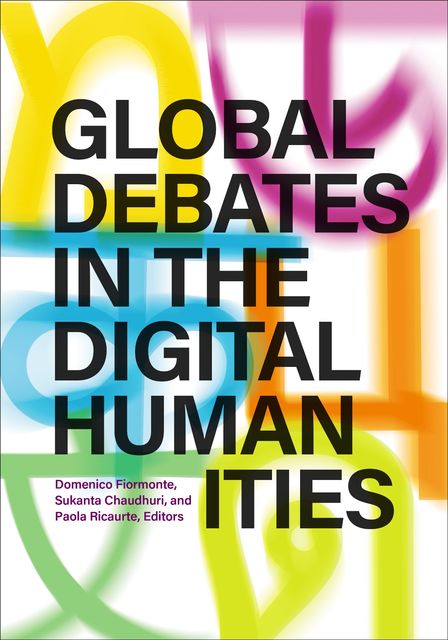 Global Debates in the Digital Humanities
by
Domenico Fiormonte (Editor); Sukanta Chaudhari (Editor); Paola Ricaurte (Editor)
This collection addresses the lack of perspectives beyond Westernized and Anglophone contexts in the digital humanities. Focused on work that has been underappreciated for linguistic, cultural, or geopolitical reasons, contributors showcase alternative histories that detail the rise of the digital humanities in the Global South and other “invisible” contexts and explore the implications of a truly global digital humanities.
Global Debates in the Digital Humanities
by
Domenico Fiormonte (Editor); Sukanta Chaudhari (Editor); Paola Ricaurte (Editor)
This collection addresses the lack of perspectives beyond Westernized and Anglophone contexts in the digital humanities. Focused on work that has been underappreciated for linguistic, cultural, or geopolitical reasons, contributors showcase alternative histories that detail the rise of the digital humanities in the Global South and other “invisible” contexts and explore the implications of a truly global digital humanities.
 The Digital Humanities and Literary Studies
by
Martin Paul Eve
This book delivers an introduction and overview of developing intersections between digital methods and literary studies. The Digital Humanities and Literary Studies serves as a starting place for those who wish to learn more about the possibilities, and the limitations, of the oft-touted digital humanities in the literary space. The volume engages with the proponents of digital humanities and its detractors alike, aiming to offer a fair and balanced perspective on this controversial topic. The book combines a survey and background approach with original literary research and, therefore, straddles the divide between seasoned digital experts and interested newcomers.
The Digital Humanities and Literary Studies
by
Martin Paul Eve
This book delivers an introduction and overview of developing intersections between digital methods and literary studies. The Digital Humanities and Literary Studies serves as a starting place for those who wish to learn more about the possibilities, and the limitations, of the oft-touted digital humanities in the literary space. The volume engages with the proponents of digital humanities and its detractors alike, aiming to offer a fair and balanced perspective on this controversial topic. The book combines a survey and background approach with original literary research and, therefore, straddles the divide between seasoned digital experts and interested newcomers.
 People, Practice, Power: Digital Humanities outside the Center
by
Anne B. McGrail (Editor); Angel David Nieves (Editor); Siobhan Senier
Focusing on the complex infrastructure that undergirds the field of digital humanities, People, Practice, Power examines the economic, social, and political factors that shape such academic endeavors. The multitude of perspectives comprising this collection offers both a much-needed critique of the existing structures for digital scholarship and the means to generate broader representation within the field.
People, Practice, Power: Digital Humanities outside the Center
by
Anne B. McGrail (Editor); Angel David Nieves (Editor); Siobhan Senier
Focusing on the complex infrastructure that undergirds the field of digital humanities, People, Practice, Power examines the economic, social, and political factors that shape such academic endeavors. The multitude of perspectives comprising this collection offers both a much-needed critique of the existing structures for digital scholarship and the means to generate broader representation within the field.
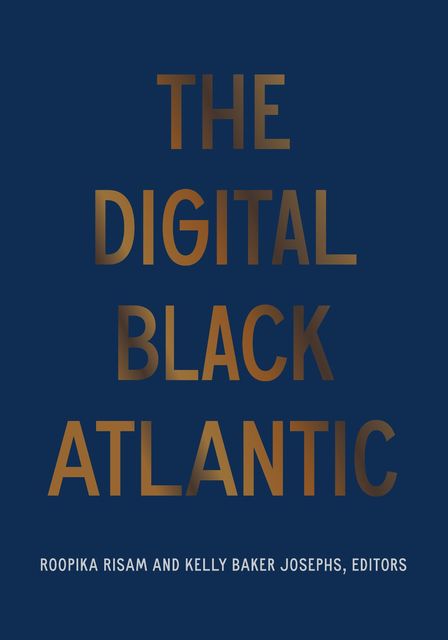 The Digital Black Atlantic
by
Roopika Risam (Editor); Kelly Baker Josephs (Editor)
This timely collection of essays about the relationship between digital humanities and Black Atlantic studies offers critical insights into race, migration, media, and scholarly knowledge production. It spans the African diaspora’s range—from Africa to North America, Europe, and the Caribbean—while its essayists span academic fields—from history and literary studies to musicology, game studies, and library and information studies.
The Digital Black Atlantic
by
Roopika Risam (Editor); Kelly Baker Josephs (Editor)
This timely collection of essays about the relationship between digital humanities and Black Atlantic studies offers critical insights into race, migration, media, and scholarly knowledge production. It spans the African diaspora’s range—from Africa to North America, Europe, and the Caribbean—while its essayists span academic fields—from history and literary studies to musicology, game studies, and library and information studies.
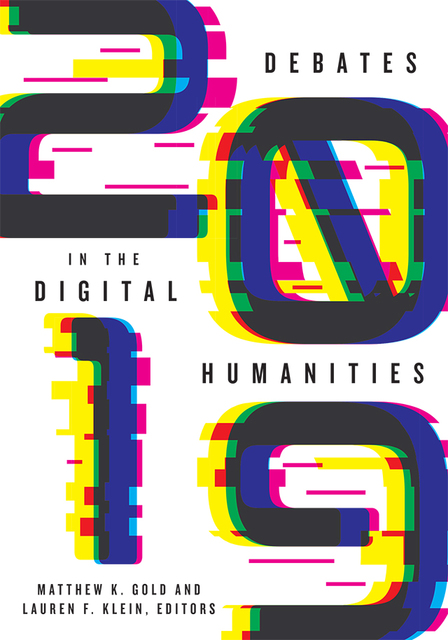 Debates in the Digital Humanities 2019
by
Matthew K. Gold (Editor); Lauren F. Klein (Editor)
Debates in the Digital Humanities 2019 collects a broad array of important, thought-provoking perspectives on the field’s many sides. With a wide range of subjects including gender-based assumptions made by algorithms, the place of the digital humanities within art history, and data-based methods for exhuming forgotten histories, it assembles a who’s who of the field in more than thirty impactful essays.
Debates in the Digital Humanities 2019
by
Matthew K. Gold (Editor); Lauren F. Klein (Editor)
Debates in the Digital Humanities 2019 collects a broad array of important, thought-provoking perspectives on the field’s many sides. With a wide range of subjects including gender-based assumptions made by algorithms, the place of the digital humanities within art history, and data-based methods for exhuming forgotten histories, it assembles a who’s who of the field in more than thirty impactful essays.
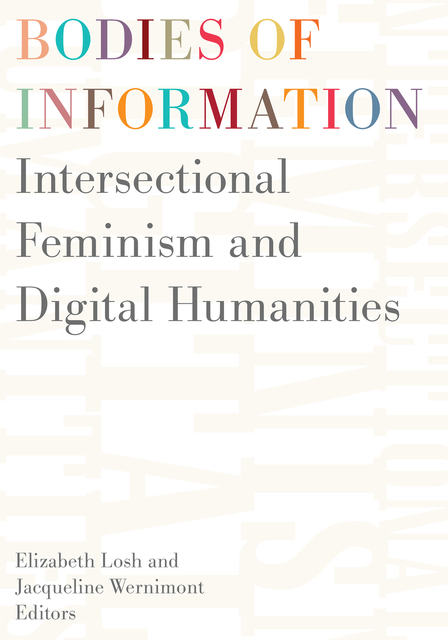 Bodies of Information: Intersectional Feminism and Digital Humanities
by
Jacqueline Wernimont (Editor): Elizabeth Losh (Editor)
Can the digital humanities complicate the basic assumptions of tech culture, or will this body of scholarship and practices simply reinforce preexisting biases? Bodies of Information addresses this question by assembling a varied group of leading voices, showcasing feminist contributions to topics including ubiquitous computing, game studies, new materialisms, and cultural phenomena like hashtag activism, hacktivism, and campaigns against online misogyny.
Bodies of Information: Intersectional Feminism and Digital Humanities
by
Jacqueline Wernimont (Editor): Elizabeth Losh (Editor)
Can the digital humanities complicate the basic assumptions of tech culture, or will this body of scholarship and practices simply reinforce preexisting biases? Bodies of Information addresses this question by assembling a varied group of leading voices, showcasing feminist contributions to topics including ubiquitous computing, game studies, new materialisms, and cultural phenomena like hashtag activism, hacktivism, and campaigns against online misogyny.
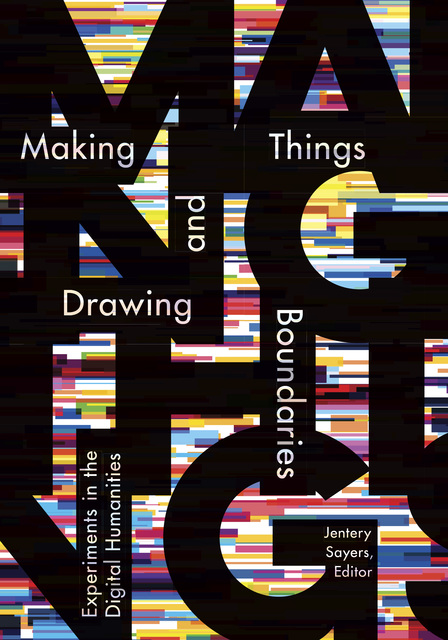 Making Things and Drawing Boundaries: Experiments in the Digital Humanities
by
Jentery Sayers (Editor)
Foregrounding the interdisciplinary character of experimental methods and hands-on research, this collection asks what it means to “make” things in the humanities. Comprising almost forty chapters from ninety practitioners across twenty disciplines, Making Things and Drawing Boundaries speaks directly and extensively to how humanities research engages a growing interest in “maker” culture, however “making” may be defined.
Making Things and Drawing Boundaries: Experiments in the Digital Humanities
by
Jentery Sayers (Editor)
Foregrounding the interdisciplinary character of experimental methods and hands-on research, this collection asks what it means to “make” things in the humanities. Comprising almost forty chapters from ninety practitioners across twenty disciplines, Making Things and Drawing Boundaries speaks directly and extensively to how humanities research engages a growing interest in “maker” culture, however “making” may be defined.
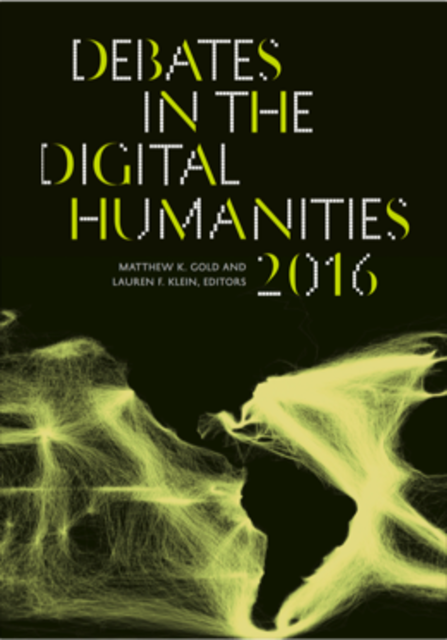 Debates in the Digital Humanities 2016
by
Matthew K. Gold (Editor); Lauren F. Klein (Editor)
Pairing full-length scholarly essays with shorter pieces drawn from scholarly blogs and conference presentations, as well as commissioned interviews and position statements, Debates in the Digital Humanities 2016 reveals a dynamic view of a field in negotiation with its identity, methods, and reach.
Debates in the Digital Humanities 2016
by
Matthew K. Gold (Editor); Lauren F. Klein (Editor)
Pairing full-length scholarly essays with shorter pieces drawn from scholarly blogs and conference presentations, as well as commissioned interviews and position statements, Debates in the Digital Humanities 2016 reveals a dynamic view of a field in negotiation with its identity, methods, and reach.
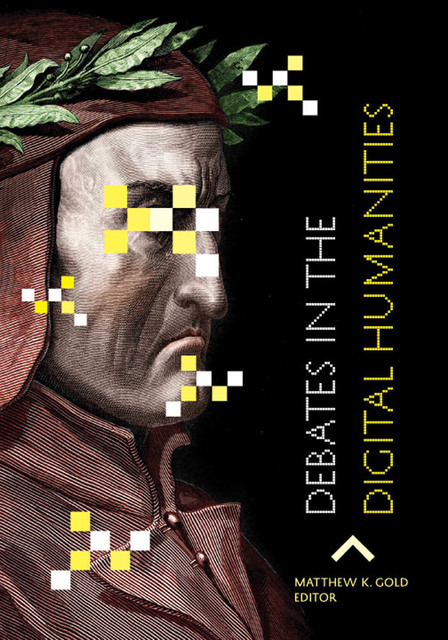 Debates in the Digital Humanities
by
Matthew K. Gold (Editor)
Debates in the Digital Humanities brings together leading figures in the field to explore its theories, methods, and practices and to clarify its multiple possibilities and tensions. Together, the essays suggest that the digital humanities is uniquely positioned to contribute to the revival of the humanities and academic life.
Debates in the Digital Humanities
by
Matthew K. Gold (Editor)
Debates in the Digital Humanities brings together leading figures in the field to explore its theories, methods, and practices and to clarify its multiple possibilities and tensions. Together, the essays suggest that the digital humanities is uniquely positioned to contribute to the revival of the humanities and academic life.


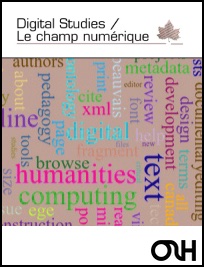


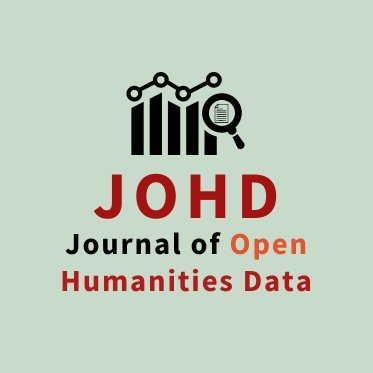


University Libraries
1858 Neil Avenue Mall
Columbus, OH 43210
Phone: (614) 292-OSUL (6785)
Accessibility | Privacy Policy | Contact Us

